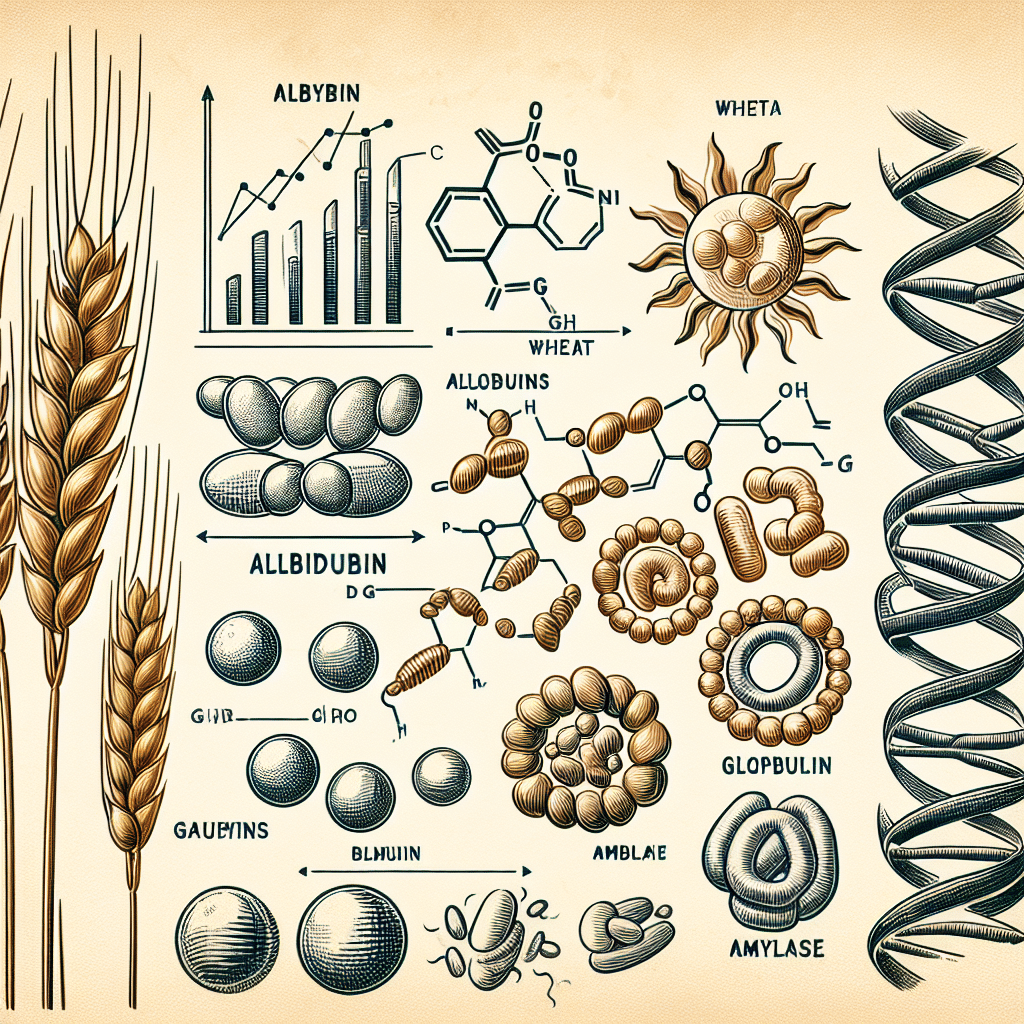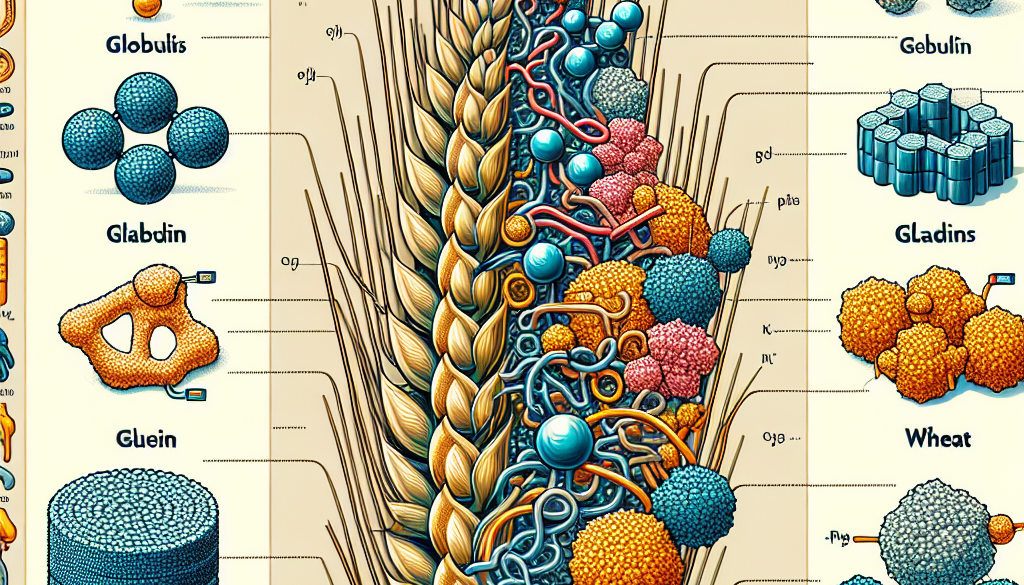What Proteins Are In Wheat Other Than Gluten?
-
Table of Contents
- Exploring the Diversity of Wheat Proteins Beyond Gluten
- Understanding Wheat Proteins Beyond Gluten
- Albumins: The Water-Soluble Proteins
- Globulins: The Salt-Soluble Proteins
- Nutritional Significance of Non-Gluten Proteins in Wheat
- Functional Roles of Non-Gluten Wheat Proteins
- Health Implications of Non-Gluten Proteins
- Applications in Food Science and Industry
- Conclusion: The Untapped Potential of Wheat’s Proteome
- Discover ETprotein’s Diverse Protein Offerings
Exploring the Diversity of Wheat Proteins Beyond Gluten

Wheat is a staple food for a large portion of the world’s population and is renowned for its versatility in the culinary world. While gluten, a group of proteins found in wheat, has gained widespread attention due to its association with celiac disease and gluten sensitivity, wheat is composed of a myriad of other proteins that play crucial roles in nutrition, baking properties, and food science. This article delves into the lesser-known proteins in wheat, exploring their functions, benefits, and potential applications.
Understanding Wheat Proteins Beyond Gluten
Gluten is the most well-known protein complex in wheat, comprising gliadins and glutenins, which are responsible for the elasticity and strength of dough. However, wheat also contains a variety of other proteins that contribute to its nutritional profile and functional properties. These proteins can be broadly categorized into albumins, globulins, gliadins (part of gluten), and glutenins (also part of gluten), with albumins and globulins being soluble in water and salt solutions, respectively.
Albumins: The Water-Soluble Proteins
- Enzymes: Albumins include a range of enzymes such as amylases, proteases, and lipases that are crucial in the germination process of wheat seeds and in the baking process.
- Protease Inhibitors: These proteins play a defensive role in protecting the wheat plant from pests and diseases.
Globulins: The Salt-Soluble Proteins
- Metabolic Proteins: Globulins are involved in the storage and metabolism of nutrients within the wheat kernel.
- Immunoglobulins: These proteins are part of the plant’s immune response system.
Nutritional Significance of Non-Gluten Proteins in Wheat
Non-gluten proteins in wheat contribute significantly to the nutritional value of wheat-based foods. They are sources of essential amino acids, vitamins, and minerals that are vital for human health.
- Amino Acids: Albumins and globulins contain essential amino acids that are not produced by the human body and must be obtained through diet.
- Minerals: These proteins often bind to minerals such as iron, zinc, and magnesium, aiding in their storage and bioavailability.
Functional Roles of Non-Gluten Wheat Proteins
The functional properties of non-gluten proteins in wheat are diverse and contribute to the quality of wheat-based products.
- Enzymatic Activity: The enzymes present in albumins are crucial for the fermentation process in bread-making, affecting dough rise and texture.
- Emulsification: Some globulins have emulsifying properties that can be harnessed in food processing.
Health Implications of Non-Gluten Proteins
While gluten proteins are associated with health issues for certain individuals, non-gluten proteins are generally considered safe and beneficial. However, they can also be allergenic to a subset of the population.
- Allergies: Wheat allergies are often triggered by albumins and globulins, not just gluten.
- Digestibility: Non-gluten proteins are typically more digestible than gluten, making them suitable for a wider range of diets.
Applications in Food Science and Industry
Non-gluten proteins have potential applications in the development of functional foods and novel food products.
- Protein Fortification: These proteins can be isolated and used to fortify foods, enhancing their nutritional profile.
- Non-Gluten Products: For individuals with gluten intolerance, non-gluten wheat proteins can be utilized to create gluten-free products.
Conclusion: The Untapped Potential of Wheat’s Proteome
In conclusion, wheat’s proteome extends far beyond gluten, encompassing a variety of proteins with unique nutritional, functional, and health-related properties. Understanding these proteins offers opportunities for the development of enhanced wheat-based products and caters to the diverse dietary needs of the global population. As research continues to unravel the complexities of wheat proteins, we can expect to see innovative applications that leverage the full potential of this staple grain.
Discover ETprotein’s Diverse Protein Offerings
If you’re interested in exploring a range of high-quality protein products, ETprotein offers an extensive selection that caters to various industries and dietary preferences. Their non-GMO, allergen-free proteins, including organic rice protein, pea protein, and seed-based proteins, provide excellent alternatives for those seeking to diversify their protein sources or create specialized nutritional products.
About ETprotein:
ETprotein, a reputable protein and L-(+)-Ergothioneine (EGT) Chinese factory manufacturer and supplier, is renowned for producing, stocking, exporting, and delivering the highest quality organic bulk vegan proteins and L-(+)-Ergothioneine. They include Organic rice protein, clear rice protein, pea protein, clear pea protein, watermelon seed protein, pumpkin seed protein, sunflower seed protein, mung bean protein, peanut protein, and L-(+)-Ergothioneine EGT Pharmaceutical grade, L-(+)-Ergothioneine EGT food grade, L-(+)-Ergothioneine EGT cosmetic grade, L-(+)-Ergothioneine EGT reference grade and L-(+)-Ergothioneine EGT standard. Their offerings, characterized by a neutral taste, non-GMO, allergen-free attributes, with L-(+)-Ergothioneine purity over 98%, 99%, cater to a diverse range of industries. They serve nutraceutical, pharmaceutical, cosmeceutical, veterinary, as well as food and beverage finished product distributors, traders, and manufacturers across Europe, USA, Canada, Australia, Thailand, Japan, Korea, Brazil, and Chile, among others.
ETprotein specialization includes exporting and delivering tailor-made protein powder and finished nutritional supplements. Their extensive product range covers sectors like Food and Beverage, Sports Nutrition, Weight Management, Dietary Supplements, Health and Wellness Products, and Infant Formula, ensuring comprehensive solutions to meet all your protein needs.
As a trusted company by leading global food and beverage brands and Fortune 500 companies, ETprotein reinforces China’s reputation in the global arena. For more information or to sample their products, please contact them and email sales(at)ETprotein.com today.














